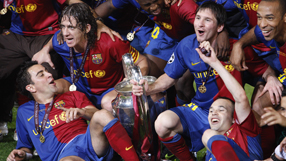Barca talent farm celebrates 30th year
BARCELONA - Behind Barcelona's Nou Camp stadium stands a traditional, 18th century, Catalan stone farmhouse that has played perhaps an even more significant role in the club's history than the colossal football arena that dwarfs it.

Barca began using La Masia de Can Planes, built in 1702, as a residence for youth recruits on October 20, 1979, and the list of young hopefuls who have passed through its wrought-iron gates on their way to the top of the football pile is long and impressive.
Pep Guardiola, champion of Europe both as a Barca player in 1992 and in his first season as coach last year, moved into the Masia in 1984 at the age of 13, leaving his home village of Santpedor around 70 kms from the city.
Former Masia residents from his current, all-conquering side include midfielder Andres Iniesta, captain Carles Puyol, goalkeeper Victor Valdes and talented young forward Pedro, scorer of the only goal against Shakhtar Donetsk in the European Super Cup in August.
Some 450 young footballers have left their homes and families to live at the Masia in the past three decades, about half from Catalonia and the rest from Spain and beyond, including Brazil, Argentina, Hungary, Georgia, Cameroon and Senegal.
More than 40 have made it into Barca's first team and almost as many have played for other sides in Spain's top division.
La Masia has become synonymous with the club's famed soccer school, although not all of the leading players the academy has produced, including forward Lionel Messi, midfielder Xavi, defender Gerard Pique and Arsenal captain Cesc Fabregas, have lived there.
NORMAL KIDS
Get FourFourTwo Newsletter
The best features, fun and footballing quizzes, straight to your inbox every week.
The secret of the Masia's success, according to Carles Folguera, director since 2002, is that as well as learning the club's special brand of stylish, attacking play, recruits undergo an intense and wide-ranging programme of education.
"What makes the Masia different is that the course is 24 hours a day, seven days a week," Folguera, a former Barca roller hockey goalkeeper who turned 41 on Monday, told Reuters.
"No stone is left unturned, in the sense that we have professionals who can meet all the needs of the youngsters who come here with a desire to triumph in their sport," he added.
"At no time are there any loose ends in the effort to make sure they can develop as normal kids."
There are currently just under 60 residents of the Masia, 10 of whom live in the farmhouse itself and the rest in rooms inside the adjacent stadium. As well as footballers, there are 11 basketball players and one roller hockey hopeful.
A typical day begins at seven a.m. and recruits spend the morning in school lessons until lunch at one p.m.
After a short rest, they study for an hour-and-a-half and then at six p.m. train for two-and-a-half hours at the club's facility out at Sant Joan Despi. Dinner is at 9.15 p.m. and lights out at 11.30.
In the week that the Masia reached its 30th anniversary as the academy residence, Guardiola was asked at a news conference what his time there had meant to him. He said he had very happy memories and the experience had helped him to grow and develop as a player and a person.
"I remember from the first day when my parents dropped me off that they
